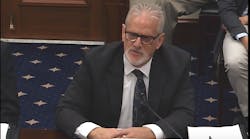A nearly two-hour meeting of the House of Representatives small business committee, chaired by Rep. Steve Chabot (R-OH), aired a wide range of grievances against the impending Dec. 18 implementation of the electronic logging device (ELD) mandate – as well as with other motor carrier regulations.
“Small businesses make up the majority of the trucking industry. In fact, 97% of trucking companies operate fewer than 20 trucks,” noted Chairman Chabot in his opening statement at the hearing, dubbed Highway to Headache: Federal Regulations on the Small Trucking Industry.
“Many of these trucking companies are owner-operators; individuals who own and operate their own truck as a one-person business,” he said. “As this Committee knows all too well, one of the biggest challenges facing America’s small businesses today is complying with federal regulations.”
Chabot noted that with many federal trucking rules taking a one-size-fits-all approach, small firms are forced to comply with what he said are often “expensive, confusing, and time-consuming regulations.”
This is not only costing small businesses, he added, “but costing America’s economy as a whole, through lost time and delays in receiving all types of goods and products.”
Monte Wiederhold, president of seven-truck Ohio-based fleet B. L. Reever Transport, testified on behalf of the Owner-Operated Independent Drivers Association (OOIDA) and delivered “more words in five minutes” than anyone in the history of this committee,” according to Chabot – touching only not only ELDs but the need to revisit hours of service (HOS) rules and the Compliance, Safety, Accountability (CSA) program introduced by the Federal Motor Carrier Safety Administration (FMCSA) seven years ago.
ELDs “are promoted as ‘silver bullet’ solution for highway safety despite distinct lack of evidence,” he said. “In reality, they are economic weapons for driving smaller competitors out of the market like me by increasing our operating costs.”
Wiederhold added that the ELD mandate is expected to cost the trucking industry $1.8 billion annually. “It is the most expensive regulation in trucking history,” he said.
He said there are currently 200 different ELD models avaibale ranging in price from roughly $100 to $1,000 per unit. “Then have monitoring fees, $30 to $40 to $50 a month. As a small business, a fleet like me; we’re not going to realize any savings from that,” Wiederhold noted.
However, he did point out that larger fleets can generate savings from ELD adoption. “They’ve got it figuring fuel taxes and cost of operations for them [and] some will actually gain money [by using] the technology,” Wiederhold noted.
He said one large fleet that said in Congressional testimony a few years back it would save $182,000 in one year using ELDs, which included the reduction of data transmission costs by $11,000 and the elimination of a $55,000 back office position.
“We won’t realize that,” Widerhold stressed – in part because his wife is the one managing his trucking company’s back office needs.
“The trucking companies I talk to are pleading to stop this mandate,” added Marty DiGiacomo, owner of True Blue Transportation out of Harrisburg, NC, who testified on behalf of the National Association of Small Trucking Companies.
“They just can’t afford a $700 GPS device with $30 to $50 monthly fees. Trucking always a fluctuating business; you cannot depend on everything staying same all the time,” he emphasized. “No one size fits all – you cannot work that way in trucking; we have crane companies, tanker fleets, towing and recovery, and food service operators. You cannot put one set of guidelines in place and run electronic logs for everyone; it will create a nightmare, havoc, and a lot of extra cost.”
Though only four witnesses appeared at the committee hearing, with all four opposed to the ELD mandate in varying degrees, Chabot stressed that he was “aware that there may be a difference of opinion” regarding ELDs and the December 18 mandate and thus to accommodate them, “we are providing them the opportunity to submit a statement that will become part of the official hearing record.”
One such statement, signed by nine organizations including the International Brotherhood of Teamsters, the Trucking Alliance, and the National safety Council, stressed that ELDs are a “proven and cost-effective way to reduce truck driver fatigue and save lives,” with any attempt to delay or carve out exemptions to the ELD rule jeopardizing the safety of truckers and all road users.
“Truck driver fatigue has been a well-documented safety problem in the industry for decades. The National Transportation Safety Board (NTSB) has repeatedly cited fatigue as a major contributor to truck crashes and included reducing fatigue-related crashes in its 2017/2018 ‘Most Wanted List’ of safety changes,” the groups stated in their letter
“ELDs are a proven and cost-effective technology that will save lives and reduce injuries, and, according to the U.S. Department of Transportation, will result in over $1 billion in annualized net benefits,” according to the letter. “Additionally, ELDs provide an objective record of a CMV driver’s on-duty time, will increase compliance with hours of service (HOS) rules, and will simplify and streamline the efforts of law enforcement.”
Those groups went on to note that there is already “widespread use of ELD technology” in the U.S., with nearly a third of trucks currently in service equipped with electronic logging technology.
“Members of the trucking industry have known about this rule for years and have had ample time to prepare for it,” the groups said in their letter. “Moreover, the legal challenge to the final rule was unanimously rejected by the U.S. Court of Appeals for the Seventh Circuit in 2016. The three judge panel denied each and every claim brought by the parties that sought to vacate the rule. In addition, the request to the U.S. Supreme Court to review the Seventh Circuit’s ruling was denied.”



